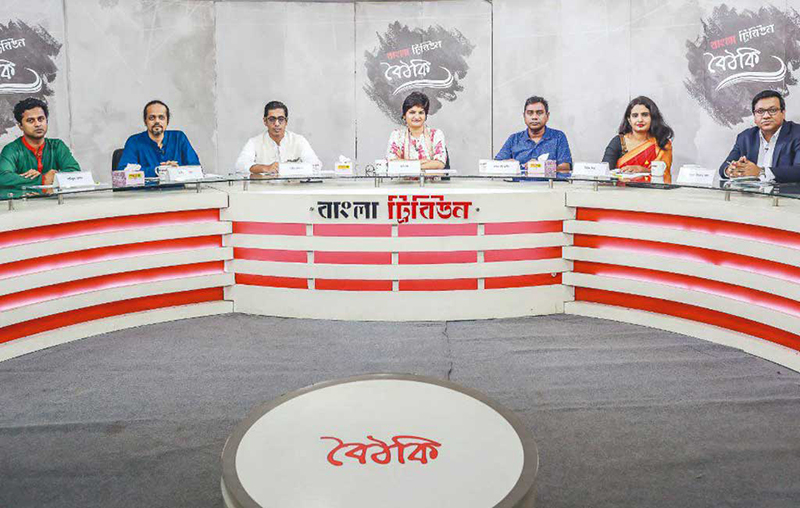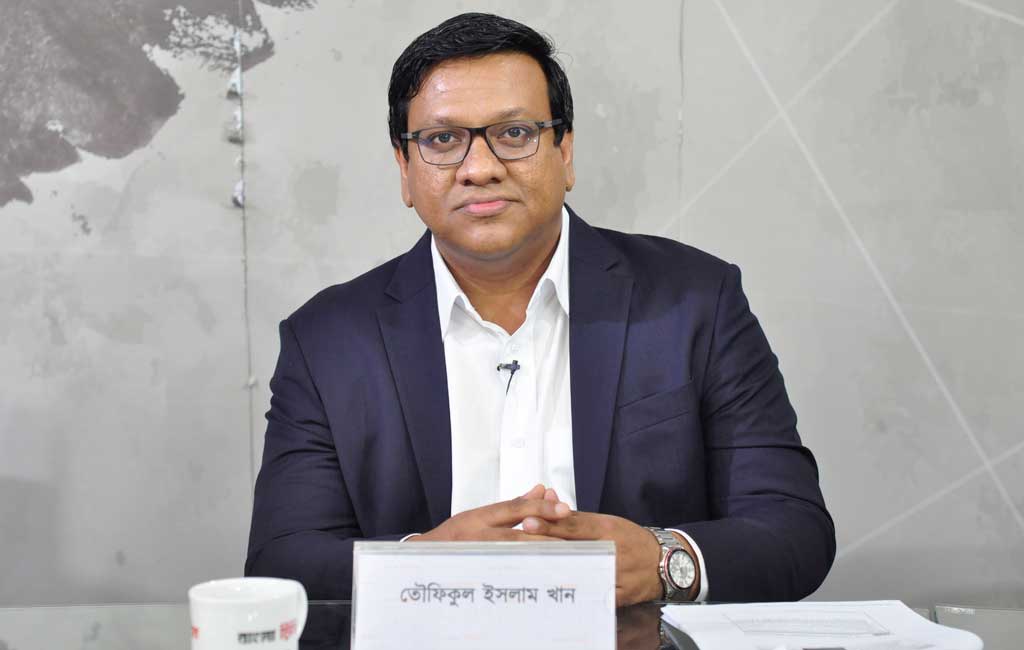Published in Dhaka Tribune on Thursday 12 September 2019

A roundtable dialogue organized by the Institute of Informatics and Development (IID), in partnership with Dhaka Tribune and Bangla Tribune
The Institute of Informatics and Development (IID) recently partnered with Dhaka Tribune and Bangla Tribune to organize a roundtable on the allocation for the youth in the national budget.
Titled “Youth employment and the budget,” the dialogue was attended by Nahim Razzaq, lawmaker and convener of Young Bangla; Syeed Ahamed, chief executive officer of IID; Md Shariful Islam Hasan, program head, migration – Brac and an online activist; Harun Ur Rashid, executive editor of Bangla Tribune; Shirin Lira, gender and social inclusion adviser at Promoting Knowledge for Accountable Systems (PROKAS) program under the British Council; and Towfiqul Islam Khan, senior research fellow at the Centre for Policy Dialogue (CPD).
The dialogue was moderated by Munni Saha, senior journalist at ATN News.
Munni Saha opened the dialogue saying: “One of the budget allocations for the youth was in the amount of Tk100 crore.” She added that a natural topic of discussion to follow is youth employment on a national scale.

It is not entirely true that our budget is being increased primarily because of the government’s lack of capacity. It is not like the entire budget allocation is disbursed at the beginning of the fiscal year, and then spent as required. The budget has a specific direction as to which sector will have what kind of budget allocation, and these grants between sectors cannot be reallocated.
The budget that has been decided upon is not very high, given our economic requirements. In fact, it should be higher. We are allocating 17% of our budget to our GDP when, given our current stage of national development, it should actually be 20%. However, in terms of implementation, we are only managing to achieve 13%. The underlying effect here is that we are not able to allocate as many resources as we need to in certain sectors, such as education and health. Compared to the global trends, we allocate the lowest in health. On the other hand, we are world leaders when it comes to spending from our own pockets. This needs to be addressed. The reason is not just our lack of capacity to spend, but also to earn.
In terms of spending, we need to monitor whether we are spending our funds on the right causes. Finishing the projects on time is also important, because a delay typically raises the expenditure – i.e. paying more wages. Also, other sectors depend on the timely completion of certain projects. A delay in finishing a project means the private sector will hold out on making their own investments to avoid risks. This compounds the problem. Alternatively, a timely completion inspires the private sector to make timely investments and thereby, opening job opportunities quickly.
We have our demographic dividend, but if we cannot use it to the optimum level within the next 20 years, it will be of no use to us. Back in 2013, the inflow into the workforce was 1.8 million. But in 2016, it dropped to 1.4 million primarily due to a decreasing trend in female participation within the labour force. Women were dropping out perhaps due to a lack of proper working environment and a sound, visible career path. There are a few conditions to be met if we want to maximize the use of demographic dividend – for example, more people should join the labour force, and these people should be young and skilled. So, there’s a close correlation between the budget and our national economic potentials.
As far as the vision behind the budget is concerned, it appears sound. Having said that, the budget is not entirely aligned with the election manifesto. The budget for a newly elected government should feel a little pressure for speed of execution, which was not there. There is now a new allocation of Tk100 crore, but how it will be spent is unclear and the details are unknown. We can only maintain pace if the budget is decided with a clear outline. Otherwise, it will take another six months to hash out the details and implementation will consequently lag behind.
The 30-million employment opportunity will not be solely provided by the government. The government will provide the infrastructure and support, while other sectors will have to contribute to the collaborative creation of these jobs. Every year, 1.4 million people are getting into the job market, and around 600,000-700,000 people are moving abroad. Our government has an aspirational plan to bring in a huge number of women into the job market. So, it boils down to whether we can create a solid career path that would inspire more women to join in and help the country maximize on our demographic dividend. Our statistics show that only a handful of women are working for more than 20 years at a stretch. And not just low-income groups – even middle-income groups are often unable to build a career. Peripheral factors are also relevant to women in the sense that transportation and accommodation need to be sufficiently facilitated and safe. So, we can no longer continue to implement the budget in a traditional manner where we simply increase it by 10% to keep the implementation at the same level. Instead, we have to incorporate the new elements currently in play and implement them more cost-effectively. We didn’t really see a structural improvement in the vision of our budget implementation process, and we have to work on that. We have to work at implementing the budget consistently throughout the year as well.

